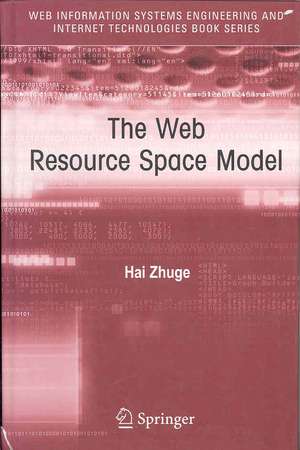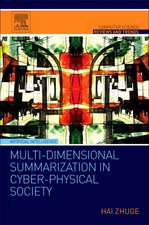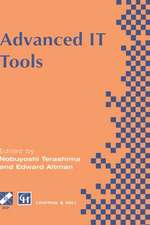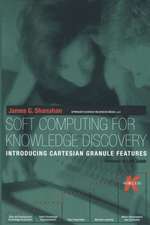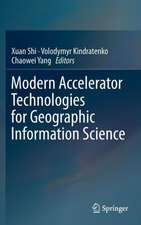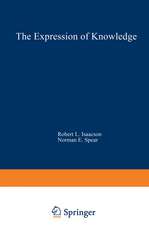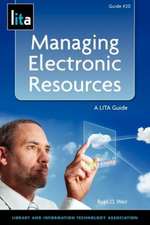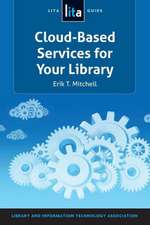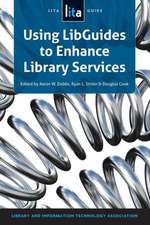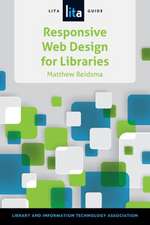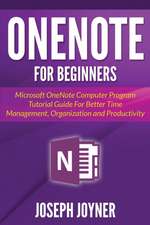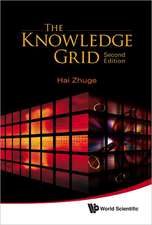The Web Resource Space Model: Web Information Systems Engineering and Internet Technologies Book Series, cartea 4
Autor Hai Zhugeen Limba Engleză Hardback – 4 dec 2007
This volume presents basic models of RSM and the Semantic Link Network (SLN), the relationship between the two, and an approach to integrating the two models and exploring their semantic-rich interconnection. Also detailed is a comprehensive theory of query operations on RSM and extensive coverage of the distributed RSM in parallel with the distributed relational database systems.
This text is sure to be considered a substantial contribution to the field of Knowledge Grid by researchers in the areas of web, semantic web, and decentralized data engineering, as well as the emerging semantic and knowledge grid arena.
| Toate formatele și edițiile | Preț | Express |
|---|---|---|
| Paperback (1) | 637.54 lei 6-8 săpt. | |
| Springer Us – 10 noi 2010 | 637.54 lei 6-8 săpt. | |
| Hardback (1) | 649.60 lei 6-8 săpt. | |
| Springer Us – 4 dec 2007 | 649.60 lei 6-8 săpt. |
Preț: 649.60 lei
Preț vechi: 812.01 lei
-20% Nou
Puncte Express: 974
Preț estimativ în valută:
124.34€ • 135.11$ • 104.51£
124.34€ • 135.11$ • 104.51£
Carte tipărită la comandă
Livrare economică 22 aprilie-06 mai
Preluare comenzi: 021 569.72.76
Specificații
ISBN-13: 9780387727714
ISBN-10: 038772771X
Pagini: 233
Ilustrații: XII, 234 p.
Dimensiuni: 155 x 235 x 18 mm
Greutate: 0.53 kg
Ediția:2008
Editura: Springer Us
Colecția Springer
Seria Web Information Systems Engineering and Internet Technologies Book Series
Locul publicării:New York, NY, United States
ISBN-10: 038772771X
Pagini: 233
Ilustrații: XII, 234 p.
Dimensiuni: 155 x 235 x 18 mm
Greutate: 0.53 kg
Ediția:2008
Editura: Springer Us
Colecția Springer
Seria Web Information Systems Engineering and Internet Technologies Book Series
Locul publicării:New York, NY, United States
Public țintă
ResearchCuprins
Resource Space Model Methodology.- A Semantic Overlay Integrating Normalization with Autonomy.- Expressiveness of Query Languages for Resource Space Model.- Algebra and Calculus of the Resource Space Model.- Searching Complexity of Resource Space Model.- Resource Space Model Storage.- Structured Peer-to-Peer Resource Space.- Unstructured Peer-to-Peer Resource Space.- Probabilistic Resource Space Model.
Textul de pe ultima copertă
Classifying objects into categories at different granularity levels, establishing links between known objects, and discovering clues between known and unknown objects are essential for new-generation semantic data models. This book introduces the Resource Space Model (RSM), which effectively organizes and correctly manages resources by normalizing classification semantics.
The author, an internationally cited expert in the knowledge grid field, explores these topics:
The author, an internationally cited expert in the knowledge grid field, explores these topics:
- A general methodology of the RSM – the origin, fundamental concepts, characteristics and the development method
- The relationship between the RSM and the Semantic Link Network, which forms a richer semantic data model to support advanced distributed applications
- The completeness and necessity theory for query operations of the RSM
- The algebra and calculus theory for query operations of the RSM
- The complexity of searching the resource space
- The physical storage mechanism of the resource space
- The P2P-based decentralized resource space
- The probabilistic RSM, which enables users or applications to deal with uncertainty when storing and retrieving resources
Caracteristici
Introduces the Resource Space Model (RSM) and relevant theories to efficiently manage e-resources by normalized classification semantics Author is leading, well-cited figure in Knowledge Grid area
